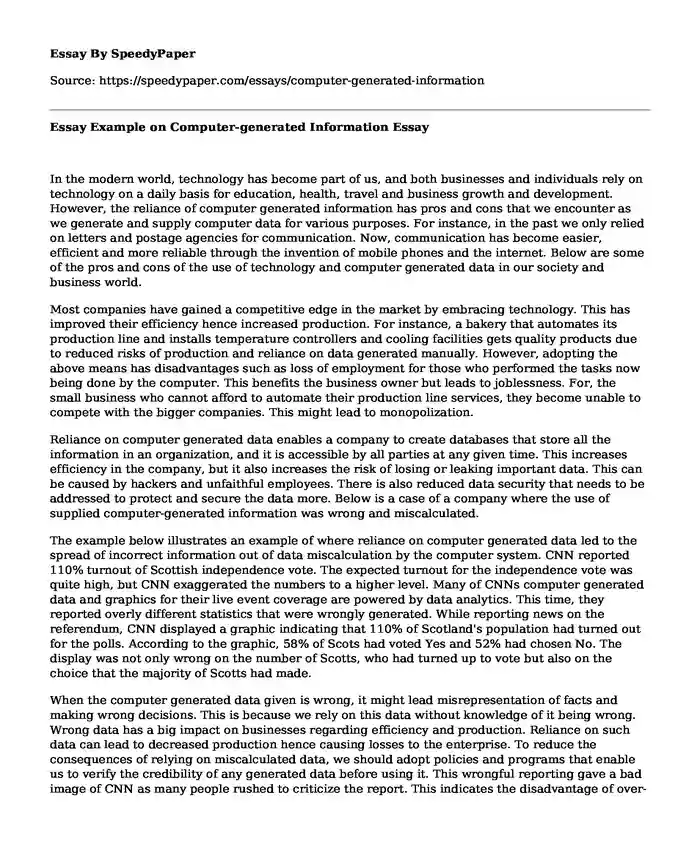
| Type of paper: | Essay |
| Categories: | Business Information technologies |
| Pages: | 3 |
| Wordcount: | 622 words |
In the modern world, technology has become part of us, and both businesses and individuals rely on technology on a daily basis for education, health, travel and business growth and development. However, the reliance of computer generated information has pros and cons that we encounter as we generate and supply computer data for various purposes. For instance, in the past we only relied on letters and postage agencies for communication. Now, communication has become easier, efficient and more reliable through the invention of mobile phones and the internet. Below are some of the pros and cons of the use of technology and computer generated data in our society and business world.
Most companies have gained a competitive edge in the market by embracing technology. This has improved their efficiency hence increased production. For instance, a bakery that automates its production line and installs temperature controllers and cooling facilities gets quality products due to reduced risks of production and reliance on data generated manually. However, adopting the above means has disadvantages such as loss of employment for those who performed the tasks now being done by the computer. This benefits the business owner but leads to joblessness. For, the small business who cannot afford to automate their production line services, they become unable to compete with the bigger companies. This might lead to monopolization.
Reliance on computer generated data enables a company to create databases that store all the information in an organization, and it is accessible by all parties at any given time. This increases efficiency in the company, but it also increases the risk of losing or leaking important data. This can be caused by hackers and unfaithful employees. There is also reduced data security that needs to be addressed to protect and secure the data more. Below is a case of a company where the use of supplied computer-generated information was wrong and miscalculated.
The example below illustrates an example of where reliance on computer generated data led to the spread of incorrect information out of data miscalculation by the computer system. CNN reported 110% turnout of Scottish independence vote. The expected turnout for the independence vote was quite high, but CNN exaggerated the numbers to a higher level. Many of CNNs computer generated data and graphics for their live event coverage are powered by data analytics. This time, they reported overly different statistics that were wrongly generated. While reporting news on the referendum, CNN displayed a graphic indicating that 110% of Scotland's population had turned out for the polls. According to the graphic, 58% of Scots had voted Yes and 52% had chosen No. The display was not only wrong on the number of Scotts, who had turned up to vote but also on the choice that the majority of Scotts had made.
When the computer generated data given is wrong, it might lead misrepresentation of facts and making wrong decisions. This is because we rely on this data without knowledge of it being wrong. Wrong data has a big impact on businesses regarding efficiency and production. Reliance on such data can lead to decreased production hence causing losses to the enterprise. To reduce the consequences of relying on miscalculated data, we should adopt policies and programs that enable us to verify the credibility of any generated data before using it. This wrongful reporting gave a bad image of CNN as many people rushed to criticize the report. This indicates the disadvantage of over-relying on computer generated data. Therefore, the above illustrate the consequences that arise from relying on computer generated data before verifying its credibility.
Work Cited
Reddy, Trips. "7 Big Data Blunders You're Thankful Your Company Didn't Make." Umbel. Umbel Corp., 2014. Web. 27 Oct. 2015. https://www.umbel.com/blog/big-data/7-big-data-blunders/
Cite this page
Essay Example on Computer-generated Information. (2019, Jun 06). Retrieved from https://speedypaper.net/essays/computer-generated-information
Request Removal
If you are the original author of this essay and no longer wish to have it published on the SpeedyPaper website, please click below to request its removal:
- Free Essay with Nursing Student Tips
- Argumentative Essay Example: The Number of Rental Mopeds Should Be Limited
- Landlord Tenant Law - Learn More from Our Free Essay
- Essay Sample with a Contextual Discussion on the Adaptation to Heart Failure
- Free Essay about the External Societal Factors to Juvenile Delinquency
- Free Essay on "The Mother" by Gwendolyn Brooks
- Essay Sample on Marxism vs. Socialism
Popular categories




